March 2008 Archives
Tommy and Stefu came over to spend a day playing games. Johanna was very kind to take Nooa to her parents so we could have our place for us. A chance to play longer, meatier games in such a great company is rare and something to cherish.
We did start with some actual meat, though. In order to save precious gaming time, I had prepared us a meal so the time spent cooking wouldn't be out of game time. I'd rate my sour cream chicken fillet in feta cream sauce with mashed potatoes at least a nine... Very good, very good. Of course it's best to start heavy intellectual exercise with a heavy meal, right?
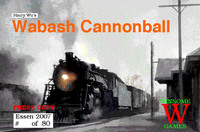
Our first game was Wabash Cannonball. It was the first time for Tommy and Stefu - and Stefu had even missed the hype altogether - as well as my first game with three. I'm glad to report the game works really well with three. Some of the alliance structures are lost, but otherwise it's just fine.
I was able to give the boys a beating. Tommy showed good eye for the game when he fenced Stefu's B&O in, stumping its expansion. I lead NYC to Chicago, continued by running the Wabash to Chicago as well (well, Tommy and Stefu thought only one company could run to Chicago, but at least I had to pay 12 to buy both Wabash shares as Tommy was ending the game as fast as he could). All in all they both played well for newbies, but at the same time I'm glad my experience paid off.
Wabash will be Tommy's 500th rated game in Geek, by the way - a good game for a nice achievement. I'm at 498 after the weekend.
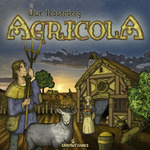
Advanced game of Agricola was on my wishlist, so that's what we played next. This was my second game with cards, this time using all three decks at once. And guess what? This game reinforced my view that playing family game is a good idea.
I suppose it's a question of practise, but my game was pretty bad. I was missing all the basics, while focusing too much on the cards. I had cards that supported wheat strategy, but I failed to take care of my fields. I want to play the game more with cards and learn to play it well, but in order to give newbies a better game experience, I really think the cards should wait until all players are experienced. At least so far I've had better time with the family game, as I've been able to do much better without the cards.
Tommy ruled our game: he played an excellent game, scoring 51 points. Stefu went begging and ended up with just 11 points, while I had 24. Shameful, shameful...
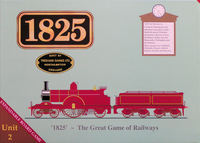
We wanted some 18xx on the schedule as well. Our game of choice was 1825 Unit 2, armed with the minor companies. Because of the added companies, we adjusted the bank to £6000. That was a good amount, the game was starting to become stale in the end.
1825 is pretty mellow for an 18xx game. The stock market is two-dimensional and only affected by the performance of the companies: no dividends and the share value falls, dividends paid and the share value goes up, the amount of steps depending on how good dividends were paid. The train rush is really slow, as only the 5 trains make the 2s obsolete. Even then, the company director never has to buy new trains, he can just dump the company and put it in receivership.
The first stock round was hectic, we bought bunch of shares. Both LNWR and MR started and other shares were sold as well. LNWR - that would be me - made some track-building mistakes and lost growth potential for a long time. The share value got to 180, at which point I decided I was cashing out. That was nice, except it allowed Tommy to take hold of the company, steal its money and only 3 train to MR and then dump it. That was the very point where the winner of the game was decided. My inexperience shows, I suppose. Lesson learnt.
Tommy run MR well, in the end it had runs of 320 so it just kept making money and gaining value. No reason to abandon ship, really. Both GCR and GNR started and ran pretty well... At least GNR did, as Tommy was able to work it together with MR to help them both. Stefu ran GCR with slightly less success, it was a tad stuck for a while.
Everybody avoided NER as its position seemed bad. It got started later when the situation got better, but it's certainly one of the least attractive companies in the game. The North Staffordshire minor wasn't very attractive either, and it was never opened. I got L&Y, since it had pretty good prospects and I was able to buy most of the shares myself. I also started Furness, since it seemed like there was some good potential for cooperation with those companies. I screwed up L&Y, though - but it was fun. You see, I was able to buy a 5 train with the starting money. I decided I would buy a 6 train for the company. So I kept running the train, keeping the money while the share value plunged down.
In the end I was able to buy the 6 train, but at that point the game was already hopelessly over. In the last OR I was able to make a run for 360. The share value was pretty low at that point, so it jumped up the maximum of four steps easily (and would've jumped another 3-4 steps next time, I think). Unfortunately the large dividend payment emptied the bank. In most 18xx games it wouldn't have been that bad, since it was the first OR of three, but in 1825 the game is over immediately after the OR when bank ends, period.
Too bad, and I would've been much better off just running the 5 train and collecting dividends, but I had a dream and I wanted to pursue it, no matter the cost. Silly me, but it was fun, making that huge run in the end, so I suppose it was worth it.
In the end the final scores were Tommy £5373, Stefu £5077 and me £4448. Share portfolios were worth £3184 for Tommy, £2941 for Stefu and £2575 for me, rest of it was cash in hand. Our game took three hours to play, and quite a bit to setup, explain and clean away.

I paid a rather hefty sum of money for my 1825 set and I'm glad to say I enjoyed it. I think this is what I want from an 18xx game, really: route building and some financial planning. I don't miss stock manipulation or other complicated trickery. 1825 has quite enough meat for a three-hour game, and since it's so short, it's much easier to play than the six-hour behemoths.
Unit 2 is a good three-player game. The map is small and tight and seems to offer interesting challenges and possibilities for cooperation. The supplementary tiles were a small help. Not absolutely necessary, I'd say based on this one game, but nice to have. I liked the minors, or at least Furness, and maybe the North Staffordshire works too if the tracks are laid some other way. I will probably include them in future as well.
After the game it was a food break. I made some pizza. Once again, to optimize the use of time, I had made the dough earlier, before Tommy and Stefu arrived, and now I just had to turn it to a pizza. I've been doing pizza about once a week for a long time and I've got a method. The secrets of a good pizza are simple: not too much fillings (just few slices of good peppered ham and two small tomatoes), way too much mozzarella on top and a sprinkle of basil-flavoured olive oil as a final touch.

While waiting for the pizza, we played a quick game of Jungle Speed with the expansion. The expansion is particularly nasty: many of the cards are nearly identical - but not quite enough. I'm fairly sure we had more mistakes than successful duels.
Anyway, the expansion makes the game rather evil. That's always nice. There's particularly nice card to give the poor little brains a final twist. Usually in Jungle Speed, you must grab the totem pole on the middle of the table if the card in front of you matches the card in front of someone else. Well, after that one card is played, you must grab the totem if the card in front of your left-hand neighbour matches. That's surprisingly difficult.
Jungle Speed isn't a very good three-player game, though, and the new cards made the problem worse. There were rather few matches during the game, which was another reason for few successful duels. I won the game in the end, fortunately. I'd rather eat pizza.
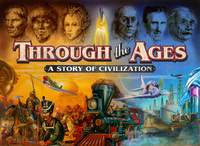
After pizza it was time for another game we had decided to play in advance: Through the Ages, full game of course. This is a favourite for all three of us. Going in, my goal was not to win, but to play better than before. I knew I wasn't a likely winner, considering both Tommy and Stefu had previous experience of full game, while I had only played two games of advanced game, and both of them rather weakly as well.
I made it! I was last, no doubt about that, but I was really satisfied in my game. Instead of putting too much energy to building up my basic production, I focused on things that actually helped my game. I had the most light bulbs and a decent culture production early in the game. Of course, in the end things got too expensive for my production, but I was doing pretty well to the early era III or so.
Stefu got a huge lead with Michelangelo, so Tommy focused on throwing wars and aggressions at Stefu. Our game was fairly low on military otherwise, just one territory and few confrontations between Tommy and Stefu. Tommy did win the game, as even though he was badly behind early in the game, he worked his culture production to over 20 per turn and in the end passed Stefu: 230-204-182.
This really shows the meaning of full game. In advanced game, Stefu's Michelangelo would've been an unstoppable monster. In the full game, Tommy's stronger but slower engine had enough time to churn enough culture to win. So full game is the way to go. On the positive side: we played the full game in three hours! Not bad, not bad at all! The downtime was rather tolerable, except at times in the end.
Through the Ages is an excellent game in the right circumstances, but in the wrong situation it's a disaster. Throw in just one slow player and the game experience becomes a lot worse. Playing two-player games is probably the safest way to go, if time is an issue, or at least one needs to pick the players well.

After a long game like that one needs some relaxation. Besides, it was already quite late. So, Race for the Galaxy it was. We played two swift rounds, with close scores. Good way to relax!

Final game of the evening was In the Year of the Dragon, the new and popular Alea title from Stefan Feld. This is not a feel-good game: players are Chinese whatevers trying to survive a year filled with disasters. Mongols attack, plague hits, drought comes, emperor wants taxes, all sorts of unpleasant activities.
Players build houses and fill them with all sorts of professionals. The people you hire help with the resource collection. Every turn you take an action and hire a person, then event happens. You can avoid the bad stuff by taking the right precautions, but the catch is that you simply don't have the time or the resources to do that every time (especially since everybody else will be wanting to do the same things), so you have to bite the bullett few times.
The bad events (not all of them are evil, and some are more evil than others) kill off your people you so painstakingly collect. If you make mistakes, you might end up losing most of your helpful little people (that happened to me). There are quite a few ways to score points, either during the game or in the end.
It's fairly interesting and the whole theme of living in interesting times is kind of fun. Still, I found the game lacking, in some respect. It's hard to say exactly what's wrong, but some way this game just didn't do it for me. Sure, I got hit pretty badly by the events, but I'm not just whining because I lost... It's just that I didn't have much fun playing the game.
I suppose I should give the game another chance, but it's certainly not high on my list of games to play.
At this point we went to bed, satisfied of a good day of gaming. We didn't expect to play any more games in the morning, but there was a change of plans and the boys didn't have to leave right after breakfast. I knew what I wanted to play!

I had recently read The Design and Development of Age of Steam Expansion: Montréal Métro. So, I took my collection of AoS stuff and dug until I found the Montréal Métro expansion.
It's a three-player map, with some very interesting rules. All track must form a single network. Government builds a neutral link each turn, and special engines may run extra neutral links. The auction is slightly tighter and the actions are more balanced than usual.
It was fun. We soon made quite a maze of tracks in Montréal, as me and Stefu focused on the middle part of the map. I made the best use of neutral tracks, while Tommy used them least. I found them highly useful. With my 3+2 and 4+2 engines I was able to run 5-link and 6-link runs (using a maximum of 3 and 4 player links, respectively) for 3 or 4 profit, collecting cubes from a large area. Using neutral links doesn't increase income, but it sure gives lots of flexibility.
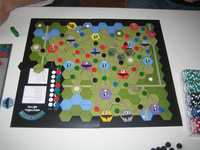
Our game was close until the end. During the last three or so rounds I was able to do constant 4-link runs. I could've updated my engines to 5+2, but I found it more effective to run several 4-link runs instead of one or two fives... This because you can only upgrade the critical first number of your engines by skipping goods movement, using Locomotive only gives you extra government links power.
In the end I won clearly 69-55-42. Funny enough, the order me-Stefu-Tommy was the same as our use of government links: I had +2 engines, Stefu had +1 engines and Tommy used the basic +0 engines. Everybody enjoyed the expansion, and why not? It's well-balanced, offers very interesting challenges and some pretty tight money management. Highly recommended, if you're looking for a great three-player Age of Steam experience.
And that's it! Hours of excellent games in excellent company, what more can you expect?

I was writing about Cuba on the Finnish Board Game Society forums after my latest experience with the game and I think my friend Tommy hit the nail on the head on what I don't like about the game.
It's the lack of snowballing. Valerie Putnam wrote about Snowballs and Princess Brides on Boardgame News and here's the essential quote about snowball games:
Players start the game with minimal resources and must use what they have to build more. Slowly your meager beginnings, through careful effort, gain enough momentum to become self-sustaining. It's like a snowball that is finally solid enough to grow bigger just by pushing it down a powdery slope. The winner is typically the player who accomplishes this most efficiently.
In a way, Cuba feels like an economic game in the vein of Puerto Rico et cetera, but what you're able to do on turn six isn't much better than what you can do on turn two or three. Sure, you get more buildings, but the buildings are all the same, there's no "get small building, use it to get more stuff, buy a bigger building that's more powerful than the small building" effect.
And that, I think, is the biggest problem with Cuba. I don't get the sense of achieving something, it's all the same during the whole game.
Of course, the sense of achievement doesn't have to mean snowballing. Well, I think one can classify Age of Steam as a snowball game even though it isn't quite like the Puerto Rico family, but still: you start with minimal resources and build more. Building track produces income, which gives more options and so on... And in addition to the growing capabilities and satisfaction of actually making money, there's the sense of achievement from building track and watching the networks grow, making larger runs and so on.
I visited my mom at Jyväskylä with Nooa. Thanks to Easter, we stayed for three days, which - of course! - presented us with more opportunities for games (two evenings and Nooa's nap time on Saturday). That in mind, I brought some new games to try.

Black Vienna was a major hit. It went down so well I'm surprised I haven't tried it before. We ended up playing ten games during the weekend, averaging about 20-30 minutes per round I think, so it was a rather huge chunk of time, too.
It's just that good. Iain played it recently and was disappointed, but I don't have a problem with the game. We didn't make a single mistake, and to be honest, I think Black Vienna is not particularly prone for these kinds of mistakes. There are other deduction games where information mistakes are easier to make.
What Black Vienna has is a healthy dose of luck: the question cards (each lists three suspects, and player who receives the card must mark how many of the suspects she knows are innocent) limit your play and there are times when you don't have a good question to ask (and the game will break down soon if the three members of the Black Vienna criminal gang appear on single question card, but that's fortunately very rare). However, the question cards make the note-taking a lot easier, making Black Vienna a pleasantly challenging game - not too hard, not too easy.
So yeah, I enjoyed it a lot. It was fun to have some actual repeat plays: in five years or so, I've played Black Vienna four times. Now I got ten plays in two days. That was very nice, especially as I won six or so... It actually takes some gambling to play Black Vienna. In one of the games, I had sorted out two of the criminals and had some clue who the third one might be. When I realized none of the questions available would increase the amount of information I had and the game was coming to a close, I decided to make a guess. If I remember it correctly, I even got it right.
This weekend certainly increased my appreciation of Black Vienna. Oh, and Iain - The Third Man was shown on Finnish TV yesterday and I got my wife to record it.

Cuba was another new game I introduced last weekend. I was pretty sure about this one and indeed, they enjoyed it. We played two games and I'm glad to report both were quite fast. First one took us 80 minutes - sure, not particularly quick but much faster than 2.5 hours - and the second one took just 50 minutes.
Ismo was particularly good in this one, he beat us in both games. In the first one, he crushed us with the water subsidy, hoarding the water and collecting tons of points each round (we initially missed the rule that limits the points to seven per round, but that didn't matter much). In the second game... I don't know exactly what he did, but it was a success. I'm not very good in this game, all I see is the get sugar/tobacco, produce rum/cigars, convert them to points strategy.
Anyway, it was decent fun, even though Cuba is definitely not my favourite game. I still rate it as eight. I recently went through my ratings at Geek and dropped quite a few nines to eights and eights to sevens, but with these two games, Cuba stays as an eight. It is a very good game, but not something I'd list as a personal favourite of mine. However, I'm interested in exploring the game a bit more, preferably with three quick players to keep the play time around one hour.

Agricola is a regular favourite at Jyväskylä nowadays and of course I brought it with me. However, with the new games, we only played one game. Since I've noticed Raija and Ismo take one game to warm up after taking a break from the game, I was able to win the game pretty easily (I played a good game myself). Once the English-language edition comes out, I should probably either buy them the game or push them to buy it...
Anyway, what's interesting about the game is the new updates I tried for the first time. As we played family game with three, we had the new day labourer (one food and either stone, wood, clay or reed), the new bake bread and/or build stables action and the three-player card "get one stone" changed to "get one stone, wood, clay or reed".
The card wasn't used, because the day labourer is obviously better. However, having at least one of them is good, because the extra reed is necessary in three-player games. The day labourer was used often. The new baking action was good, too, there was at least one or two rounds where both baking actions were used. That's one part of the game that could use opening up. So, I'd say both are good additions.

I played an interesting game of Flix Mix with my brother: we got the game to lock up. In the first round, I got to one card left faster than he did, but then lost because I couldn't place the card anywhere. In the second round, we both were left holding one card we couldn't play (the cards were as identical as they come, which explains a lot). Funny thing, and certainly something I didn't expect! Lesson learnt: Flix Mix is probably best with at least three players.

Thanks to Easter, we had to reschedule our Thursday games to Wednesday. I started the session with Don. It's been a while since I last played this little filler. Too long, actually, as I was already getting hazy with the rules. That's unconvenient, as I only have the German rules... Well, we did play it right in the end.
It's nothing spectacular, but perhaps I should play it a tad more often? It's pretty cool for a small auction game. Few people seem to like it, my rating of seven stands pretty high amongst my GeekBuddies (but Iain likes the game).

Then we played Wabash Cannonball. Two games this time, both with same group of experienced players. That's nice and effective, though Wabash is pretty easy to explain.
Hannu got the first one, dominated it, really. I was stuck with a pretty weak portfolio. Hannu ran the NYC with great success. I was doing fine with shared Pennsylvania, but when Hannu snatched the third share, it kind of lost the point. Hannu was basically involved in every good deal on the board, which is a no-brainer. I don't actually know what went wrong here.
The second one was all mine. I got Pennsylvania, but instead of the standard expansion, I capitalized NYC. NYC expanded twice and B&O once, blocking Pennsylvania in. That suited me, I just let it rot there - hey, I'm getting $7 in dividends every round doing nothing, suits me fine! NYC had some good prospects, but when the share distribution went 1-1-1-1, it kind of lost momentum. Nobody bought the fifth one, even though NYC was, what, four hexes from Chicago (that fourth hex was probably critical, one hex closer and it would've been different thing).
Riku got stuck, he had the same shares as Hannu but paid more for them. Hannu also made a bit of a blunder when he let me have a share of B&O for five bucks. I must've made about $30 with that share, and I was able to develop B&O with Petri leaving Hannu out of the equation (I knew Hannu was my biggest enemy). Hannu got the final nail in the coffin, when he bought Wabash for eight when the line to Chicago cost ten. Ouch.
Really interesting, once again. The two games were quite different! First one took 50 minutes, second just 40 minutes, which was rather effective. Wabash is a devious game, and I love it more and more. It's also breaking records: no big game has ever been played three weeks in a row in our game evenings. In general we do repeat plays rarely. It's just that good...

After Wabash we played Great Wall of China. This game by Reiner Knizia is kind of like Samurai, but quite different. It's supposed to be a 30-minute semifiller, but for me, it's more like 40-45 minutes. Tad too long, that is.
I had learnt something from my previous games. I drew cards quickly to get a strong hand and then picked my battles carefully, avoiding the big slugfests. That was successfull, I was able to win with a safe enough margin. It's a nice game, but perhaps not my cup of tea. I think I'll try to sell it...
Quick game of Set finished off the evening. Well, not that quick, we sucked and had to draw the extra cards quite a few times...
I was pining for a copy of Pampas Railroads before. Not any more! There's talk of a reprint! It's P100 project, that is, if JC Lawrence can get 100 pre-orders, a reprint will be done. P100 for Pampas Railroads is where you sign up. The orders are at 40 or so at the moment, so it's going to happen, I believe. Pretty cool.
I updated my GeekList Gamer's games published in Finnish - it's been a while since the last update, I had quite a few games to add. It's now 139 titles long, and features such games as Modern Art, Chinatown, Bausack, Gulo Gulo, Wits & Wagers, Qwirkle... Pretty cool.

More Wabash Cannonball. Hannu was keen to give the game another go and so was I. We were joined by Petri and Make, both newbies. It was an interesting game... This time we played for long, it took us almost 90 minutes to finish. Petri tends to do that for games, I've noticed, but we also had what, six dividends or so. We just didn't capitalize aggressively enough, I suppose.
I had a plan: I wanted to drive a railroad to Chicago. I got NYC and did exactly that. The costs were bad, though, as people kept diluting the shares and I kept paying ridiculous amounts of money to keep the company worth something. It was a lesson learned, let's just say, and next time I won't be as silly. I only had NYC, you see, so I had to fight to have a chance. Make had a different strategy: in the end he had one share from each company. Petri had mostly C&O, and was able to keep the company to himself for a long time, which sealed his victory.
Oh, and talk about curious results: I had over 100 money in the end, yet I lost. Petri had something like 160. It was a crazy game. It is interesting how the game can develop in so many directions. I know (now) that my plan was sheer idiocy, but I had to try it to see what happens. Next time I'll try something else. I still enjoyed the game a lot, it was very exciting even though (or maybe because) I was a fool.

Hannu wanted to play Thebes, which he had bought on his visit to Germany recently. We continued from trains to archeology. Our merry table talk got even merrier, when we started digging up treasure. Hannu particularly got a ribbing, when he first spent quite a while talking about archeology (playing congress cards) and then botched just about all his excavations big time. Oops.
So yeah, this is not a game for the faint of heart, but if you don't mind the huge swings of luck involved, the game does marry good theme to solid game mechanics in a way few games can. It's simply fun. I don't know if Thebes is something I'd want to play a lot, but every now and then it's sure good entertainment. Me and Hannu agreed, though, that the two-player game has something to it that the four-player game loses. I like the way there's more time for research in the two-player game. Well, it's fun both ways.
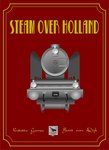
Steam over Holland arrived today. Actually, yesterday I went to the Netherland's post web site to check when the package should actually arrive, and it turned out it was supposed to arrive yesterday or today. Well, here it is now, right on time.
I'm kind of used to 18xx games being drab and kind of minimalistic in their look, but this one's different. Right from the box, the game has a slipcase and a box, both very thick and sturdy. The contents are top notch: mounted board, nice tiles, wooden houses for stations, proper cards for trains and shares... The box has a nice insert, which keeps the board in place over the other contents. Best of all, there's a certificate of authenticity - like Mike Doyle suggested some time ago. Very nice touch!
What about the game? I don't know, seems interesting, I think I like the concept of game limited to 15 rounds (that is just five stock rounds and two operating rounds for each stock round). Other than that it's hard to say, hopefully I get to play this soon. The length is just long enough to make playing this on Thursday evenings tricky business, if we start by 16.30 (feasible) we can finish something that takes three hours, but that leaves very little room for explaining the rules.
My homemade minimalist Black Vienna set is available at BoardGameGeek, thanks to prodding from Iain. I like it myself, a lot, it's very black letters on white background, no-nonsense no-theme approach to the game.

Johanna wanted to play a game while Nooa is taking a nap (he's a good sleeper, sleeping easily two hours). We had talked about trying Thebes, so that's what we did. The theme is attractive (always important) and the game is pleasantly easy to teach (despite some problems with the English rules).
The game is about archeology. Players move around in Europe collecting knowledge, both general and special to each of the five locations. Once you think you're ready, you can hit the excavation sites and go digging. You total your knowledge, choose how many weeks to dig and depending on those two variables, you draw certain number of tiles. Tiles can contain valuable treasures or worthless rubbish.
Artifacts are worth points. Once you got some artifacts, you can put them up for an exhibition to score points, and you can also go around talking in congresses. All these activities both take time and are worth points. Time is of the essence, as there's just two to three years of time, depending on the number of players.
The turn mechanism is clever. It's similar to Neuland. Each action takes certain amount of weeks and for each week, you move forward on the time track on the board. Whoever is last on the time track (and has thus used least time so far) gets the next turn. It's fluid, simple and makes you really think about how to best use your time.
There are other clever things. You can amass general knowledge that works on all excavation sites, but you can only as much general knowledge as you have special knowledge, so that too is very necessary. Special knowledge is also worth bonus points in the end.
In our game, I was the better archeologist: my digs were hugely successful. In the end, I had something like 70 points from my artefacts, while Johanna had about 45 points from hers. She drew much more rubble and 1-point artefacts, which was actually rather frustrating and unpleasant. However, once we counted the exhibitions, she was leading the game by one point and after the special knowledge bonuses, she won by 16 points.
So, lesson learnt: digging the best artefacts is pointless, if you don't tell the world that you've dug up cool stuff. That surprising turn of events made Johanna feel better, but she was still somewhat upset about the game and I agree, it wasn't fun for me either to draw all these excellent artefacts while she drew rubbish. With my gamer buddies it's perhaps different and bad draws would probably cause immense taunting and teasing, but with Johanna that sort of game just isn't fun.
Better watch out, then, especially when playing with folks that have tendency for being frustrated. If that's a problem, it's probably best to fix the game a bit. As it is, each excavation bag holds 14 artefacts and 16 bits of rubble (and the empty tiles are always returned to the bag) and it's easy to change the game by removing some of the empty tiles, for example.
However, if you don't mind that and can accept the fact that there's quite a bit of luck in the game, what you'll get is a rather pleasant and well-executed advanced family game. The rules are simple and easy to teach, the game moves swiftly and the theme definitely works. Balancing between advance preparations and actual digging is fun. So, with some caveats, Thebes is a very good game.
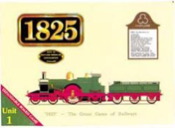
I went and bought 1825 from BGG marketplace. It's a full set, too, all three units (but none of the extra kits). Why? I don't know, I suppose because it was there? Well, it does seem like an interesting game. I've read nice things about it from Geek and I think I might like the emphasis on track-building instead of stock manipulations.
Well, I'll see about that. I do like the flexibility on player amounts and the short playtime. If the game can be played in two and half hours in a meaningful way, that would be really, really sweet, because it would make playing on Thursday evenings possible. Three hours would be fairly cool, too. So, it'll be interesting to see how it turns out.
I'm still waiting for my copy of Steam over Holland, sent from Netherlands two weeks ago. I'm getting anxious, because stuff usually arrives in a week from Europe. Well, the seller has only positive feedback at Geek, so I suppose he just sent the game using slower mail service (consider how cheap the shipping was, I'm fairly sure it wasn't priority mail). Not that I would have time to play the game, but...
Thursday I also received my copy of Ur 1830 BC, which is Splotter's slightly heretical take on 18xx. Instead of shares in railroads, players buy land in Mesopotamia and build irrigation networks. The basic elements of 18xx are there, with some interesting twists. The game has decent ratings, nothing superb but solid enough. I like most of what Splotter has done and I think the theme is quite interesting here. The way the irrigation systems works seems intriguing as well. I'm really looking forward to trying this one.
And finally, the VFLGS has made some deal with Mayfair Games and now stocks more of their games. That includes 1856 and 1870. My friend Tommy has 1856 and has played it few times. Most notably in the small con organised for Board Game Society actives back in 2006: they started Saturday morning and played for over six hours. Then they played something else, went to sauna (and played something else in sauna as well) and after that, decided to play another round of 1856. That was a quick one, just slightly over four hours. That's pretty cool, and probably a good idea too, considering most players were newbies. Like Tommy said, 1856 is as newbie-friendly as teaching someone to swim in a shark pool while beating them on the head with a brick... So anyway, there's a fairly cheap copy of 1856 calling to me, while I'm doing my best of resisting it's call. Sounds tempting, but the six-hour play time and brutality towards newbies means that the game is practically unplayable. I can imagine getting these three- and four-hour games on table, no problem, but six hours and more is just too hard.
So, all in all, I guess you could say I'm interested in 18xx games.

Thanks to series of unexpected delays, I waited and waited for my copy of Wabash Cannonball. Apparently there were problems in just about every part of proceedings. Well, the game did arrive last Wednesday, just in time for our Thursday games. I don't mind the delays now that I have the game, so thanks JC, I really appreciate you taking the trouble to act as a dealer.
The rules are fairly short and simple, this isn't a difficult game to teach. The map shows USA from east coast to Chicago. In the beginning, four railroad companies (familiar from other railroad games: B&O, C&O, Pennsylvania, NYC) start from the eastern side of the board. Players buy their shares and expand the railroads west. Chicago is some kind of optional goal.
Each turn players have three actions to choose from: capitalization, development and expansion. With expansion, railroads can expand their network, bringing in extra income. Building track costs money from company treasure. Development is used to improve the hexes, mostly to increase income. When capitalization is chosen, one share (the player taking the action chooses) is auctioned.
There's a limited number of each action available and whenever two actions run out, there's a general dividend where having shares pays off: company income is divided by the number of shares sold and each share is paid that amount from the bank.
After dividends, game end conditions are checked. Game ends when three companies are out of shares or track or when nine dividends are done. In the end, cash in hand wins the game. There are few extra tricks involved, most important of which is the Wabash Cannonball. When a company reaches Chicago, it pays extra dividends to the owners and Wabash Cannonball, a small railroad out of Fort Wayne is founded.
It's fairly simple and quite quick. We played two games, first took 60 minutes and second just 45 minutes. It's a tricky game. The game begins with four auctions where one share for each company is sold. That's a tough one for newbies, as coming up with reasonable values is pretty hard. There are few angles to it: because cash is king, you don't want to pay too much, but if you get the share for a too small amount of money, the company will be poor and won't be able to do much. After all, selling shares is pretty much the only way companies can make money. It's particularly important for Pennsylvania, as that company only has three shares to sell.
In our first game, I took the charge of NYC and drove it to Chicago for big bonuses. I had support from Hannu, who also had two NYC shares like I did. Actually, we had the same shares (two NYC, one B&O) for most of the game. That wasn't so good for Hannu, because I had more cash. One lesson learnt. Riku's game looked pretty bad, as he had relatively few shares and he had invested heavily in Pennsylvania, which was kind of stuck. Well, turns out he had lots of cash and that's good. He won the game. The Chicago bonus divident was my only way of catching him, and it wasn't enough: 100-89-82-65 (I had 89, Hannu 65).
In the second game, I bought Pennsylvania in the beginning and played it aggressively. I quickly built to Pittsburgh, going through the mountains. I decided not to run Pennsylvania to Chicago, instead I buzzed around the mountains, because mines seemed like a good place to be (they add one to income, two more when developed and only one railroad can build track in each mine hex - they're much better than cities). Of course, the vultures tried to capitalize Pennsylvania, but as I was able to grab a second share, I could let Olli have the third (and he paid a lot for it, bringing plenty of cash in the company treasury) while I developed the heck out of the company. I quit buying new shares fairly soon and in the end, my victory was really obvious: 112-73-68-66.
All in all, it's a fabulous game. It looks bad, but the stock certificates and money are the worst bits. There are better certificates in the Geek and money needs to replaced with poker chips anyway. The map is ok, it could be better but you get used to it soon and then it doesn't really matter. The decision-making is delicious, that's what counts. There are so many interesting angles to it, all sorts of approaches you could take. Hannu enjoyed the game a lot, Olli and Riku seemed to like it as well, and we're definitely playing again next week. The length it perfect for our Thursday games, we can easily play two games (seems mandatory, because once is just not enough) and still have time for something else.
This time the something else was Slovenian Tarok. Hannu had missed our session last week and wanted to play. Our game was curious. First four rounds were all successful! First me and Olli played, then Hannu and Riku, then me and Riku and then Hannu and Riku again. The best hand of those was the one with me and Riku: Riku had two kings and picked the third one from the widow. He played all three in the first three tricks and after lots of hesitation, played hearts for the fourth trick, which I won with the fourth king. Four tricks, four kings!
Then came the next hand... I bid two, because I had pagat and taroks 21, 20 and 19 to an otherwise decent hand. Riku raised to one, then called a king I didn't have. Together, we would've crushed the opposition. Left without, I obviously kontra'd the game. Riku said rekontra, which I immediately mordkontra'd. The deal was exciting, it was hard to say which side won. As I had revealed my side, Hannu was able to support me, though his plans were foiled by Olli's good trumps. In the end, Riku's team was one point short. That's -258 points, thank you!
For the final round, Hannu called the game in desperate attempt to beat me. His called king was in the widow, always an unpleasant occasion, and of course I called kontra for the game. Well, he made it and scored the double points. That wasn't enough, though, and once again I was triumphant. Tarok sure is an excellent game...
Ted Alspach released Ubongo Extrem Craxy Expansion today. It's a DIY set of 70 new puzzles for Ubongo Extrem. These craxy (extra crazy, that is) puzzles are five-tile layouts, and they sure look mean.
I printed mine out today, and after I spend some time cutting the puzzles apart (they're printed two per page), this one needs some testing. I printed mine on 100 gram colour inkjet paper, which is far from cardboard, but hopefully it doesn't matter too much in this game.
In his blog (which I hadn't noticed before) Ted has some creation notes for the expansion.
Agricola gets an update. The family board gets a new action and the day labourer action is altered. The new action (which goes in the empty spot on the family game board) is "Build stables and/or bake bread" and the day labourer now produces one food and one wood, clay, stone or reed. Also, the three-player game action card that produces one stone now produces one wood, stone, clay or reed. You can print the new stuff yourself, PDFs are provided at the Lookout Games website linked above.
The three-player game doesn't need more wood or clay, but the reed is in short supply. In the family game, baking is a major bottle-neck with five players. Day labourer is also more interesting this way. So, I'd say these are good changes. I'm definitely going to try them, at least.
Journal of Boardgame Design hasn't been updated in months. Well, a new entry was just posted: What is this board game about? is an interesting article about game concepts, linking of themes and mechanics. Go read it!
